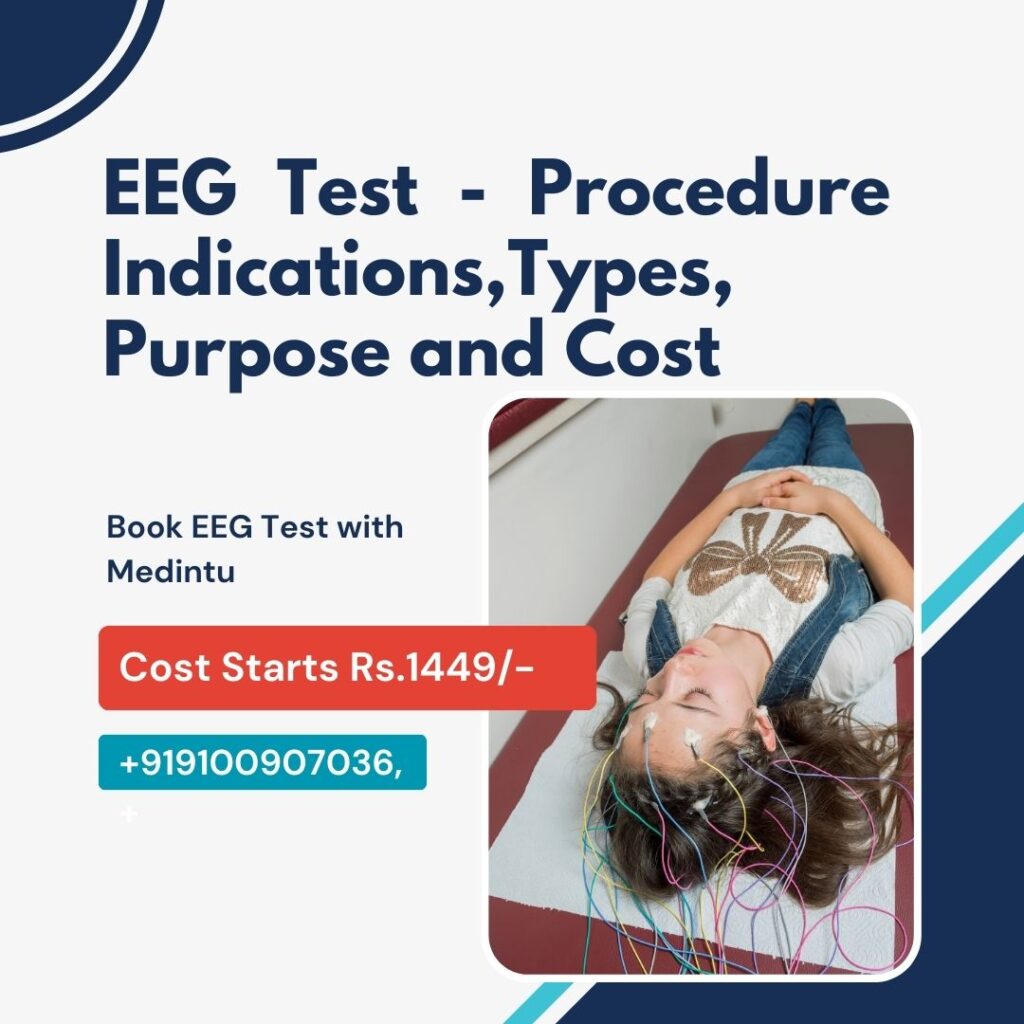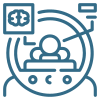EEG test at home in Hyderabad
Are you experiencing sleep issues or seizure-related problems? An EEG (electroencephalogram) could help identify the underlying cause. An EEG measures the electrical activity in the brain, which generates brain waves. These waves vary depending on different brain activities. Distortions in these brain waves can indicate abnormal brain activity, which can be detected through an EEG. This test is a simple, non-invasive method used by neurologists and epilepsy specialists to examine brain function. For accurate and reliable EEG testing, trust Medintu to provide the insights you need.
Fill out form to enquire now
Why is EEG Performed?
An EEG (electroencephalogram) is a non-invasive test used to assess brain function and electrical transmission within the brain. It is valuable for diagnosing and monitoring a variety of conditions, including:
- Epilepsy Disorders: Identifying epilepsy in both adults and children.
- Brain Electrical Activity: Detecting irregularities in the brain’s electrical signals.
- Sleep Patterns: Evaluating abnormal or normal sleep patterns and sleep disorders.
- Neurosurgery Monitoring: Observing brain activity during neurosurgery.
- Behavioural Research: Studying brain electrical signalling during various behaviours or activities.
- Post-Injury Assessment: Examining brain function following head injury, stroke, or infections like encephalitis.
How to prepare for an EEG?
Preparing for an EEG is a relatively simple process that you can request your neurologist or EEG technician explain. Some other tips that can help you prepare for an EEG are as follows:
- Tell your healthcare provider about all your medications and any other medical devices you use so that they can give you instructions for adjusting, skipping, or continuing the dose.
- Take a headbath to clean out all the grease, oil, and dirt on your hair before the procedure. Avoid styling products and conditioners to prepare your hair for the EEG test.
- Avoid stimulants like coffee and tea, as they can interfere with the results.
- Sleep well before the appointment, as fatigue and sleep deprivation can also affect your EEG test results.
- Wear loose, comfortable clothes without metallic adornments for a comfortable testing experience.
- Avoid excessive screen time and use a lot of electronics in general to prevent the influence of these devices on the brain wave.
- Eat your regular meals unless expressly advised by your healthcare provider.
8. If you feel anxious or nervous about the test, speak to your family members, doctor, or testing technician to get an idea.
Procedure for EEG test:
1. After the doctor prescribes the EEG test, we must make an appointment either in the doctor’s clinic or any other laboratory. On the day of the appointment, one can prepare for the test by following instructions from their neurologist or physician.
2. Once at the appointment, the details are confirmed, and you are made to lie down on a bed or made to sit in a chair. Remove any metal objects like pins, jewelry, clips, etc, as they may interfere with the test results.
3. The technician then applies the electrodes or small metal discs to your head using a special gel for electrical transmission and the gluing property.
4. Once the electrodes are attached, the machine is calibrated, and baseline electrical activity recording is taken. This recording is used as a reference scale to compare with other recordings taken during the test.
5. The technician will then record the readings in different states. They may ask you to perform small tasks such as reading, opening and closing your eyes, breathing deeply, or looking at flashing lights.
6. The technician will also take readings during rest, sleep, and drowsiness.
7. A senior technician monitors the process for 30 to 60 minutes.
8. After completion of the test, the electrodes are removed.
Uses Of EEG
EEG is a valuable tool for both medical research and clinical diagnostics. It plays a crucial role in assessing and monitoring various brain-related conditions and activities, including:
- Seizures: Diagnosing and monitoring seizure disorders.
- Brain Injuries: Evaluating brain function after traumatic injuries.
- Infections: Detecting abnormalities related to infections such as encephalitis.
- Behavioral Therapy: Supporting research and treatment in behavioural therapy.
- Psychiatric Conditions: Assessing and diagnosing psychiatric disorders.
- Brain Surgery Monitoring: Observing brain activity during neurosurgical procedures.
- Altered Sensorium: Evaluating changes in consciousness or awareness.
- Neurological Disorders: Assessing neurological conditions, including Alzheimer’s disease.
- Pharmacological Research: Studying the effects of drugs on brain activity for research purposes.
Why Choose Medintu?
Medintu is a leading online platform in India, offering top-quality healthcare services at affordable prices. We cater to all major metropolitan cities, including Bangalore, Mumbai, Hyderabad, Chennai, Kolkata, Pune, and Ahmedabad. Our mission is to deliver exceptional healthcare directly to your home, making it easier for you to access diagnostic tests, teleconsultations, rental medical equipment, and home-based care through Medintu.in.
Additionally, Medintu provides comprehensive EEG tests to detect electrical abnormalities in the brain. We collaborate with the best laboratories across the country to ensure reliable EEG testing and offer interpretations by renowned neurologists. Find EEG Brain test centres near you with Medintu and book your appointment today.

FAQs
EEG tests can detect several brain electrical abnormalities such as seizures, brain lesions, affected parts in brain injury, brain infection, and so on.
EEG traces the brain’s electrical activity by showing variations in electrical activity between the electrodes placed on the scalp. Specific frequencies and amplitudes of the brain waves help to detect different conditions.
The following are the main components of an EEG machine:
1. electrodes to collect the electrical signals.
2. Cap or arrays of electrodes
3. Conductive paste or get to apply the electrodes
4. Amplifiers to accentuate the electrical inputs
5. Filters for isolating the desired frequency of the waves
6. Analog to digital converter for interpreting the signal
7. Computer system to receive, store, and process the data
8. A display machine to show the brain waves collected through electrodes.
There are two main types of electrodes:
1. Surface electrodes, such as disc, silver chloride, dry, and ring electrodes, are placed on the skin or inserted into the scalp for readings.
2. Deep electrodes are inserted into the brain during neurosurgical procedures, and ECT is inserted into the brain.
The cost of EEG in India is anywhere from 1500 to 2300 rupees depending on the type of EEG, the area, and the city.







